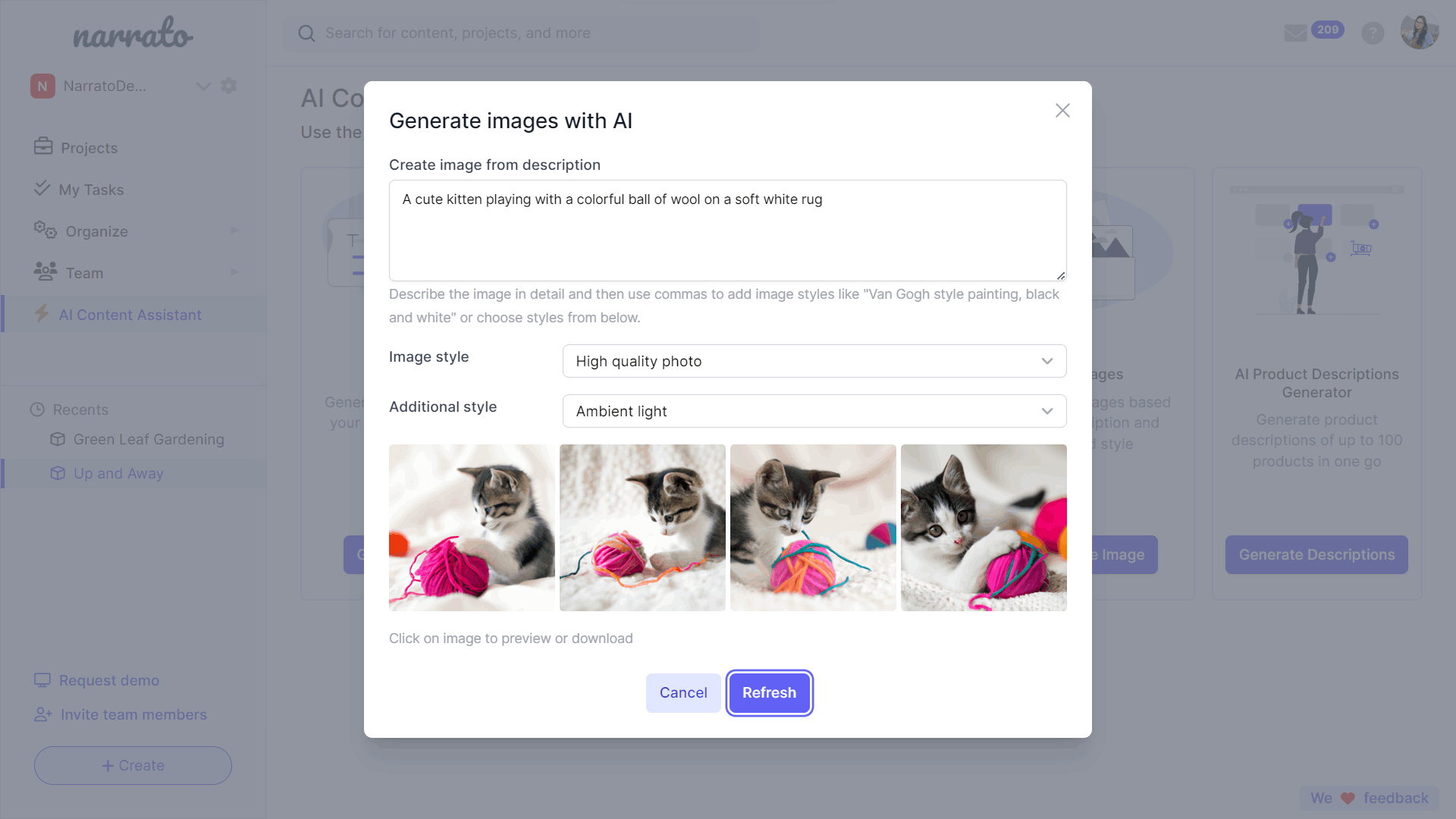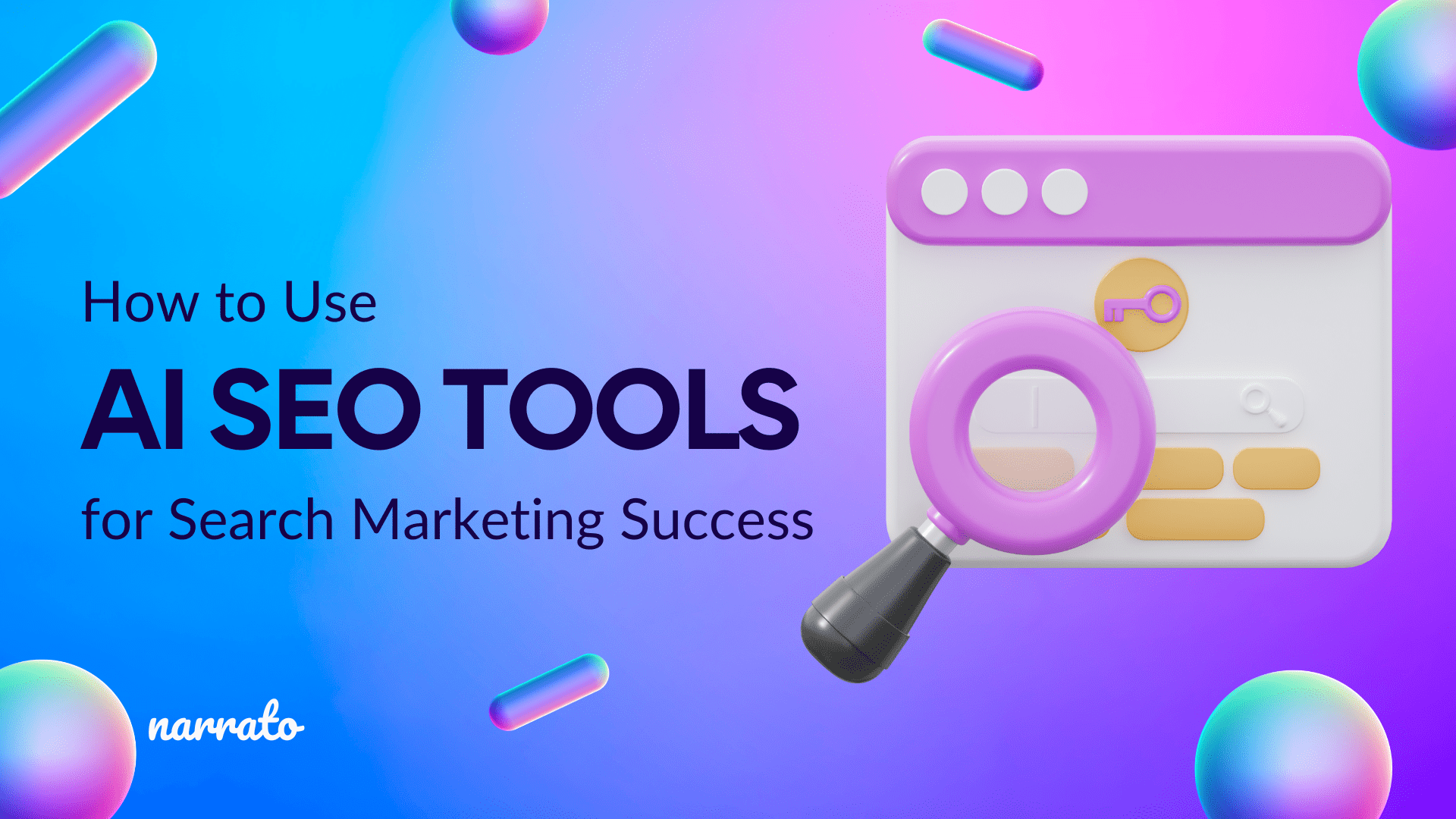As content marketers, you could often be struggling to get your website noticed and stand out from the digital crowd. If only there was some magic wand that could miraculously iron out all the nitty-gritty of SEO and help your content rank in search. Well, if you think of it, there is a magic tool. We’re talking about AI SEO tools, where artificial intelligence meets search engine optimization to streamline and simplify SEO content creation to boost your digital marketing efforts – like a genie granting wishes! AI SEO software can save you hours of work and tons of effort in content creation, while also increasing your chances of toppling your competition on the way to the top of SERPs.
But to get the most out of the AI tools for SEO on Narrato’s AI Content Assistant, you must also know how and when to use them. So without further ado, let’s dive into some best practices of leveraging SEO AI tools in your content marketing efforts.
TL;DR Here’s a quick video summarizing this article.
How to use AI SEO tools for search marketing success –
- Create SEO content with AI
- Optimize for voice search with AI
- Analyze SERP features to gain insights
- Identify user intent with AI
- Monitor and analyze user behavior
- Optimize for local SEO using AI
- Automate technical SEO audits
- Improve SEO with image and video optimization

How to use AI SEO tools for search marketing success
When we speak of search marketing, the role of AI SEO tools goes far beyond just keyword research or internal link building. Today, there is an AI tool for almost everything you need in SEO content creation and marketing. In the following sections, we hope to give you a clear idea of where and how you can use AI SEO software to save effort and time, while also increasing your chances of ranking many folds.
1. Create SEO content with AI
The first and most important use of AI SEO tools is in content creation. Most AI content creation tools today are equipped to create search-optimized content that is high-quality, relevant, and true to your brand’s voice. Leveraging AI writing tools reduces your SEO efforts by more than half.
An AI SEO writing tool can actually help you with more than just creating content. Some AI writing assistants like Narrato, have several other SEO use cases like keyword search, SEO brief generation, content optimization assistance, and more.
So, as a first step, you can use an AI content generator for keyword research. It can give you a list of keywords with volumes (that you can verify with other tools like Google Keyword Planner).

The next step would be to generate topics for your selected keywords, and an AI SEO writing tool can help with that too. The AI content ideas generator on Narrato, for instance, can give you a list of topic ideas based on your target keyword or theme. You can pick the topics you like and easily add them as new content items under a project in a few clicks.

AI SEO tools for topic ideas
Then you begin creating content, but there’s one last thing to do before that – compiling all your SEO requirements in a comprehensive brief. If your AI writing assistant has an SEO brief generator, then this step (which would manually take you at least 30 minutes) can be completed in seconds. You can further enrich this SEO content brief generated on Narrato by adding more keywords, questions, etc. discovered in your initial research.

AI SEO tools for SEO brief generation
Now that you have all the information you need, you are ready to draft a quality, optimized article, blog post or web copy that has a very good chance of ranking at the top.
At this stage too, you can take the assistance of an AI writer to generate sectional content. The AI SEO content generator will usually ask you to provide a few keywords, define your tone and audience, etc. to give you SEO-friendly content tailored to your brand’s voice and content goals.
2. Optimize for voice search with AI
You might be wondering ” What impact do voice search and artificial intelligence have on SEO and how can businesses optimize for these technologies?”
Voice search has become more of a norm than an emerging trend today. Back in a 2018 PWC Survey, people accepted that searching for something online was much easier using voice search than having to type the query. So it is safe to say that even more people rely on voice search now.
If you want to remain in the competition, it is important to optimize your content for voice search too. And SEO writing with AI can help here as well. To optimize your content for voice search using AI, it is important to understand what you need in the first place. The few key things that you’d need to go after are –
- Conversational queries – Voice search queries are longer and more conversational than typed queries
- Question-based queries – Unlike text-based search where you would just put in a few keywords in your query, voice search can include complete questions
- Featured Snippets – Voice searches often answer from Featured Snippets on Google. In fact, Backlinko says that almost 40.7% of all voice searches are answered from a Featured Snippet.
- Mobile optimization – Voice search is heavily influenced by mobile devices. The PWC survey also found that 57% of smartphone users were likely to use voice assistants, higher than any other device with the same tech. So optimizing for voice search consequently means optimizing for mobile as well.
Thankfully, AI tools for SEO can help optimize for all of these factors. They help you identify the right questions to answer, and can even help you generate the answers for these queries. The FAQ use case on Narrato’s AI SEO content generator is a good example of how an AI tool can help you address question-based queries. You also get a bunch of questions to answer on the SEO content brief. To generate answers, there is also a QnA use case where you can just type in the query and the AI tool generates an appropriate answer for you.

AI SEO tools for questions and FAQs
To appear in Featured Snippets, your content must be structured and should contain the queries that match the search intent. We’ve already taken care of the queries. But for structuring your content better, you can use templates like ‘Paragraphs to Bullets’, where you can turn a long paragraph into a structured bulleted list with zero effort.
You can also use a tool like Wordlift.io that analyzes your content and adds structured data by building a knowledge graph of your site, to make it more easily understandable for search engines.
3. Analyze SERP features to gain insights
We’ve already told you how Narrato crawls the web to curate the top keywords and questions for the SEO content brief. But there are other ways AI SEO tools can carry out SERP analysis too. AI tools can identify knowledge gaps in SERPs, spot trending topics and news, and help you understand what factors search engines may be using to rank content.
Tools like SpySERP and Mangools SERP Checker can help you analyze top-ranking content as well as the weak points of your competitors’ content. Thus, they help you optimize your content to increase your chances of ranking higher or getting featured.
4. Identify user intent with AI
To rank in search with your content may seem easy in the beginning, if you’ve optimized it well with the right keywords, links, etc. But to maintain that position, matching the user intent is crucial. If users land on your page and find that this isn’t what they were searching for, your dwell time dips, bounce rate increases, and eventually your content loses its authority.
So when optimizing your content it is important to understand the user intent you’re trying to address. This will decide which keywords to use and which questions to answer in your content.
Again, AI comes to your rescue here. Platforms like Komprehend.io and Keyword Insights have search intent analysis tools that can tell you whether a search term or a string of words is a query, a complaint, or a feedback. Or the tool might tell you whether the intent behind a search term is transactional, informational, navigational, or something else.
These insights help you make better SEO decisions and ensure that you’re targeting the right prospects or triggering the right sentiments. By understanding user intent, you can create content and optimize your website to align with what your audience is seeking.
5. Monitor and analyze user behavior
User behavior on your website can significantly impact SEO as well. Search engines are always trying to provide the best possible search results to users. User behavior can be critical signals for them to determine the quality and relevance of the content on a web page. How users engage with your content, which type of content is able to keep them on your site for longer, and what is increasing your bounce rates can all be very useful insights.
AI SEO software can track user behavior on your website, such as click-through rates, bounce rates, and time spent on page. Behavior analytics tools like Hotjar or Convizit can extract behavioral data from your website like pageviews, on-page clicks, and more to tell you what’s working and what’s not. Hotjar can even create a heatmap of your website to show you which parts of a page get the most attention and which parts get ignored by visitors.
By analyzing this data, you can gain insights into how users engage with your content and make data-driven decisions to improve your website’s user experience and search engine rankings.

6. Optimize for local SEO using AI
For a more targeted approach to search marketing, localization of content is often essential. This is especially true if your target audience is from a particular geography or demography.
SEO AI software can help you optimize your website for local search by analyzing local Google search trends, identifying location-based keywords, and monitoring your online business listings. By leveraging AI for local SEO, you can ensure that your business stands out in local search results and attracts nearby customers.
7. Automate technical SEO audits
AI SEO software can automatically perform technical SEO audits as well, ensuring that your website adheres to best practices and search engine guidelines.
From identifying broken links to analyzing website speed and mobile-friendliness, these tools can save you time and effort while maintaining a technically optimized website.
Tools like Millimetric.ai and Labrika can give you some very valuable technical SEO insights for improving your site’s ranking potential.
It is also important to perform content SEO audits from time to time to ensure your content is giving you the desired leverage.
8. Improve SEO with image and video optimization
Visuals also have an important role to play in content SEO strategy. Images, graphics, and videos within your content are essential to break the monotony of text, increase your chances of appearing in visual searches, and improve the overall user experience.
Getting the right images to go with your content has also become so much easier, thanks to AI. Using stock images is, of course, a great way to go but there is often a risk of getting in trouble for attribution issues or copyright infringement. This is where AI-powered tools like AI image generators can help improve your SEO performance. They can generate unique and high-quality images from simple text prompts within seconds.
Here’s an example of how Narrato’s AI image tool brings your ideas to life.

Narrato AI image generator
There are also AI-powered image recognition tools that can help you optimize your visual content by analyzing and tagging images based on their content. This allows search engines to understand what your visual assets are about and rank them accordingly. Apart from this, AI SEO software can help with video optimization, such as transcription, keyword analysis, and metadata optimization.
To sum it up
Leveraging AI SEO tools can significantly boost your search marketing efforts. From utilizing AI-powered content creation to optimizing for voice search and analyzing user behavior, the above tips offer unique insights and techniques that can set you apart from competitors. By staying updated on search trends and engaging with AI SEO tools, you can refine your strategies, improve your website’s visibility, and create a seamless user experience that drives organic traffic and conversions.
Remember, while AI can automate certain tasks and provide valuable insights, it is important to review all AI-generated content, interpret the data, and make informed decisions based on your specific business needs and target audience. Continuously monitor and adjust your SEO strategies to stay ahead of the curve and maintain a competitive edge. Incorporating AI SEO tools into your search marketing strategy will not only help you adapt to the evolving digital landscape but also align your efforts with user intent and search engine algorithms. So. go ahead and embrace the power of AI to enhance your content creation, optimize for new search trends, and ultimately drive more traffic and success in your search marketing endeavors.



